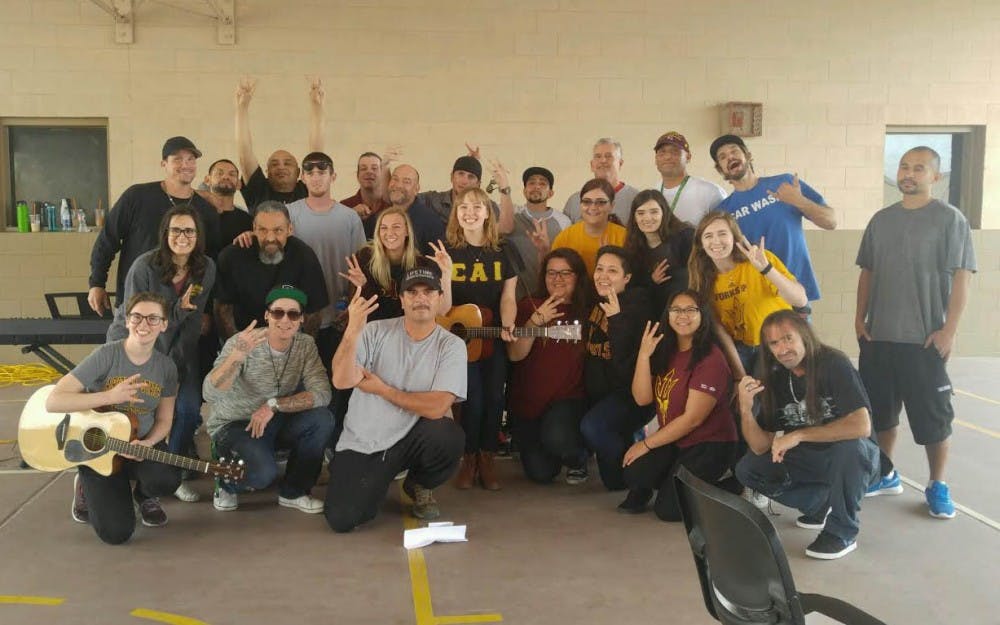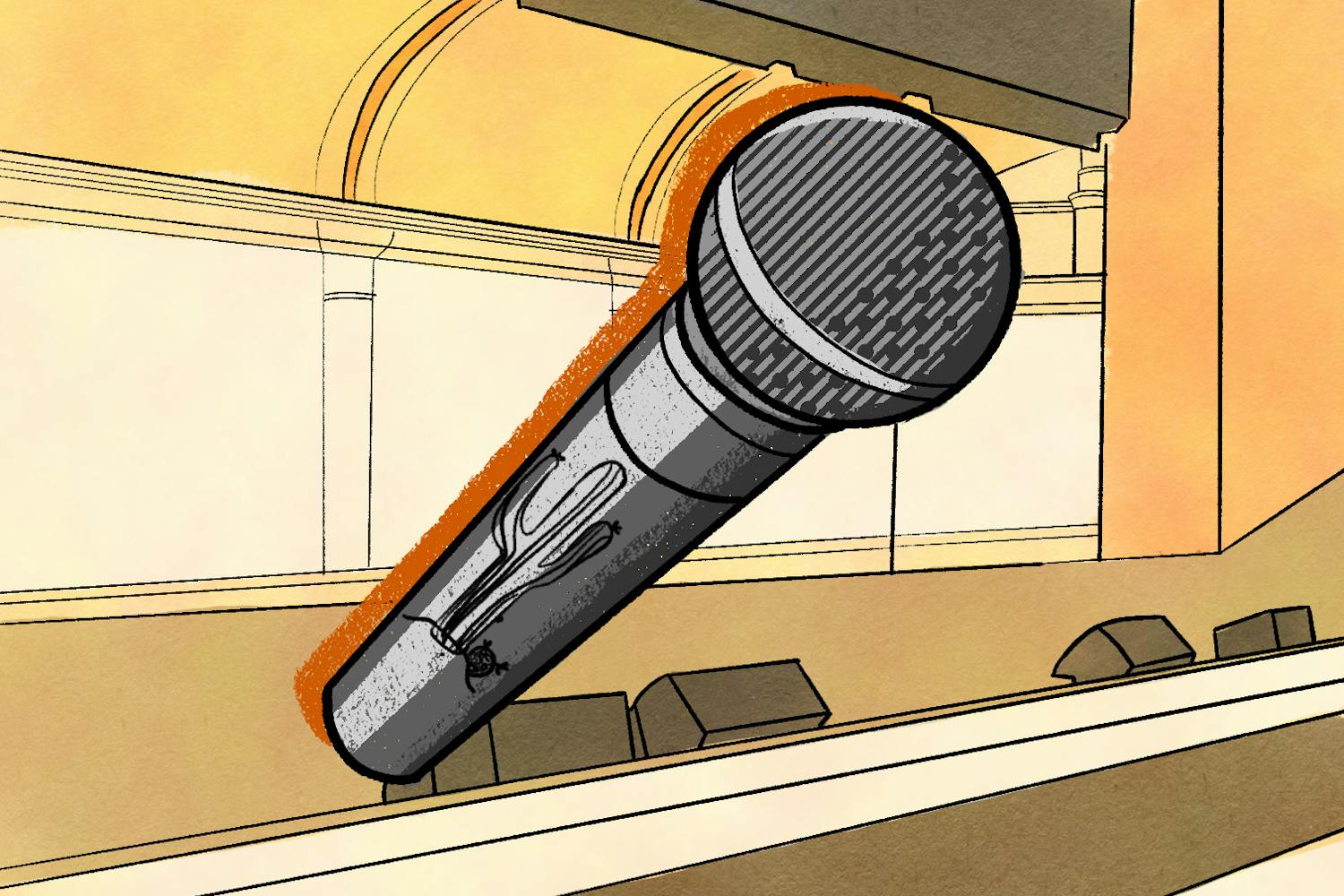In response to continual increases in incarceration and recidivism rates, ASU students are taking fresh approaches to improving conditions for those within the prison system and educating fellow students about reality within cell walls.
From music therapy to creative writing classes, various groups at ASU are working directly with local prisons and rehabilitation centers to make a local impact.
Rachel Quirbach, a music therapy senior, has been playing music since she was four years old and decided to merge her background in music with her passion for service by pursuing a degree in music therapy.
In the newly emerging field, Quirbach is one of the few scholars currently studying the impact of music therapy on people within the criminal justice system.
“Music therapy in forensic settings is starting to take off, but less than one percent of all music therapists are in it, and there are less than 5,000 music therapists out there right now,” Quirbach said.
After identifying the room for growth and lack of research in this area, Quirbach looked into the U.S. prison system and studies being conducted on women’s prison choirs in Belgium.
She decided to add a minor in criminology and applied to be in the ASU program Inside-Out, which gave her the opportunity to interact with prisoners weekly for a three-credit class.
“The Inside-Out prison exchange program was the biggest change for me,” Quirbach said. “It really humanized the entire experience.”
With this new understanding of the system, Quirbach developed and pitched a music therapy program titled "Building Hope Through Music," which is designed to help ex-offenders reduce anxiety coming out of prison, encourage creative expression, develop receptivity to social cues and advocate acceptance of differences.
The Maricopa Reentry Center was very receptive to her plans, and Quirbach began leading groups at the center two weeks later.
Hosting six groups a week for 75 to 80 minutes each, Quirbach never teaches two classes the same. She emphasizes creation, recreation, relaxation and analysis in every session.
“I come back exhausted because I give everything I have to this program and these guys because I feel like they deserve it,” Quirbach said.
The ex-offenders are excited about Quirbach’s class and aren’t afraid to let her know.
“I hear them talking about how much they love the class to the new guys or how they are still referring to something we did weeks ago,” Quirbach said.
Quirbach said the program has been as rewarding for her as it is beneficial to those in her program.
“There is the saying that ‘it is an honor to be selected to serve,’” Quirbach said. “I would say it really is an honor and a humbling experience to have the stars align perfectly to allow me to do this group.”
Katie Orrett, a senior music therapy major, was able to get a first-hand look at the program after volunteering to participate in one of the group’s concerts.
“It has given me a much clearer understanding of correction facilities and the offenders within them,” Orrett said.
Orrett said it was evident to her that the program was going to provide the ex-offender with tools that would be useful to them far into the future.
“Learning how to work through emotions and recognize coping mechanisms through music therapy will really help them once they are outside the facility,” Orrett said.
Additionally, students at ASU participate in the PEN project, an internship where students facilitate creative writing class in Arizona and New Mexico prisons. The students lead creative writing exercises and give detailed feedback to help foster a creative outlet and safe-space for incarcerated individuals.
Read More: Behind the Bars: ASU Prison Education
Christopher Harvey, a senior English major and president of the ASU Prison Education Awareness Club, participated in the PEN Project along with several other PEAC members.
Similar to "Building Hope Through Music," the PEN Project breaks down barriers within prison walls.
“The creative writing gives new life to these guys,” Harvey said. “Not only are they interacting with a part of their interior that I think they seldom see, but they are also interacting with each other in a way that they just don’t otherwise.”
Harvey said it is these moments of personal and communal growth that make the work worth it.
“If you look at how creative writing programs affect mass incarceration, I think it is negligible, but for individual lives, it puts people over the moon,” Harvey said.
In addition to the PEN Project, Harvey leads PEAC in its initiative to “propagate awareness about prison education and mass incarceration.”
An understanding of the system on all levels is the club's main mission, which is exemplified in their annual conference.
On March 16, PEAC will host the 7th Annual Prison Education Awareness Conference. The event will feature a panel of speakers including Johnny Perez and Pastor Benny Custodio from Rikers Island, Sophie Etchart, founder of Read Better Be Better, and Guillermo “Memo” Arrubla, founder of Beat Street AZ.
Both Quirbach and Harvey said they hope that other students will step in once they have graduated to continue their work in one form or another.
“Many people see the prison system as broken beyond repair, but we have to start somewhere,” Quirbach said.
Reach the reporter at goldham@asu.edu and follow @graceoldham123 on Twitter.
Like The State Press on Facebook and follow @statepress on Twitter.




